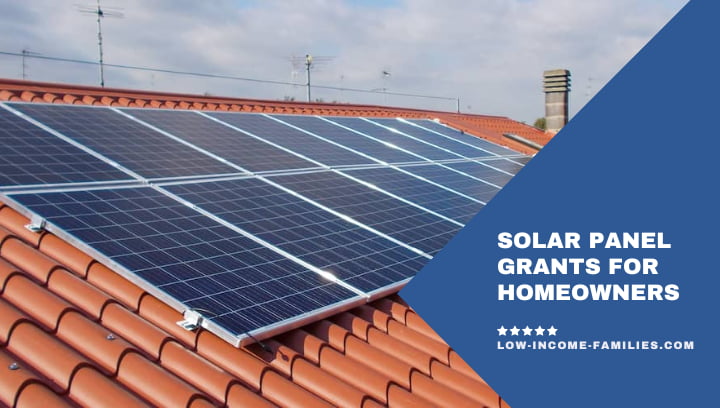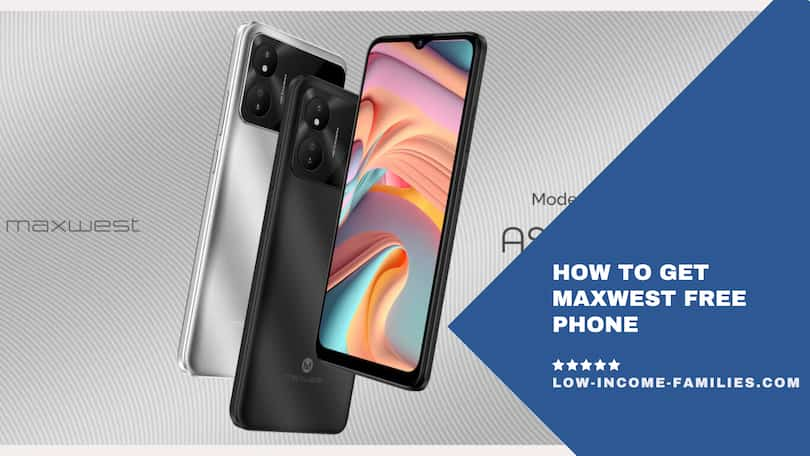Solar Panel Grants for Homeowners
The U.S. The Department of Housing and Urban Development provides Solar panel grants for homeowners, including free roof replacement grants, to people in low-income areas for home improvement using energy options.
Let us now get some information about solar panels.
Solar panels manage solar energy from the sun and convert it into electricity. The typical solar panel comprises individual solar cells, each made from layers of silicon, boron, and phosphorus.
The boron subcaste provides the positive charge, the phosphorus subcaste provides the negative charge, and the silicon wafer acts as the semiconductor.
Solar panels are a wonderful renewable energy source that meets the demand for energy at home and in assiduity.
Solar panels convert the sun’s energy into electricity, a process known as photovoltaics. This is crucial for homeowners who are looking into solar energy grants for homeowners.
Different Solar Panel Grants for Homeowners
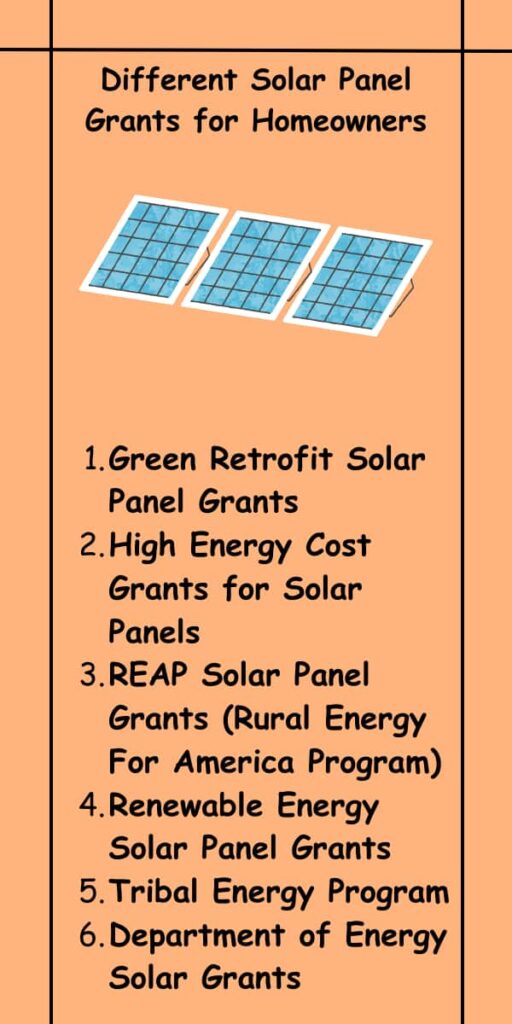
There are Different Solar Panel Grants for Homeowners. So low-income people can easily buy solar panels.
1. Green Retrofit Solar Panel Grants
These solar panel grants for homeowners are a suitable option for low-income homeowners. U.s. The department of housing and urban development (hud) provides funding for this program.
Low-income homeowners get grants under this program. This allotment is used to purchase and inaugurate solar panels to be completely foolproof. They can preserve energy and reduce the support on the solar panel grid.
There’s $ 250 million as a budget for the allotment for the people under the Housing Recovery Act. But there’s a condition that’s the allotment serving person needs to spend the allotment within two times after reaching it.
2. High Energy Cost Grants for Solar Panels
High Energy Cost grants for Solar panels stand conducted and managed by the U.S. Department of Agriculture. This department provides grants to assist low-income homeowners living in pastoral areas.
They’re also tied into the grid or out of the grid and meet the high demand for pastoral power. Surely the energy cost significantly increases, and they’ve to face this as a big expenditure. So there are grants available to induce energy from solar panels.
This allotment is used to buy, install and repair the solar panels that make sure an alternate way to induce and distribute energy. Surely the energy cost should be lesser than 275 of the public normal and U.S. Citizenship as eligibility.
The business reality may also apply to the allotment schedule underneath this division.
3. REAP Solar Panel Grants (Rural Energy For America Program)
Little establishments stand the ambitious force of the economy in the United States of America as it ensures employment for the vast maturity of people.
There are different assistance and grants for small businesses to make sure they can go forward and produce jobs for the people. When you have a small business or agriculture operation and live in pastoral areas, you can use solar panels through an allotment program.
Surely the U.S. Department of Agriculture supplies grants up to $ for a small business to serve and flourish. Small businesses use these moneybags to buy solar panels to induce electricity for their business and agriculture operation.
There are eligibility criteria to get this allotment, and it’s consequential to know these easily.
4. Renewable Energy Solar Panel Grants
The United States of America will be a renewable energy source to ensure people reduce reliance on the grid and seek another headwater of secure electricity.
For this, the U.S. Department of the Treasury provides low-income people with solar panels. This allotment comes in payment incitement rather than duty credit so that people get inspired to use renewable energy for a better hereafter.
5. Tribal Energy Program
The U.S. Department of Energy, from their headquarters of Indian energy policy and schedules, come onward to helplines use technology- grounded energy generation.
Lines can get assistance for solar panels through allotment programs under this department as there’s $ 15 million in new investment.
Lines can also apply for this allotment to ensure they’re getting energy effective in their structure and community-scale energy generating procedure in tribal lands.
They can also get help installing energy effectiveness dimensions, energy generating systems, energy structure, and integrated energy systems.
6. Department of Energy Solar Grants
The U.S. Department of Energy (DOE) Solar Energy Technology Office (SETO) supports the Department of Energy solar grants on photovoltaics. The Department of Energy provides solar grants to focus on solar-thermal power.
The Department of Energy encourages state and local governments, local governments, and non-governmental agencies for solar grants.
How to Finance for Solar Panels?
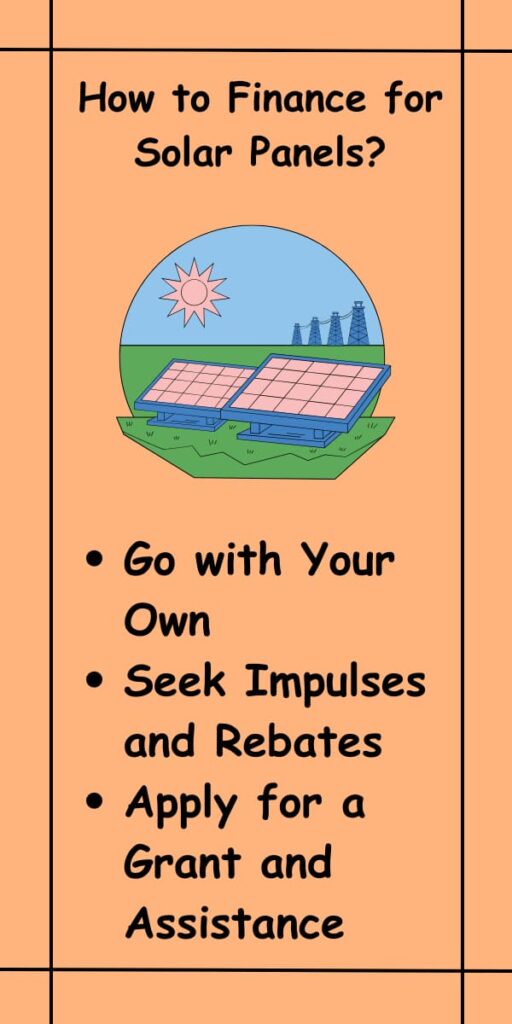
The cost of solar panels is particularly high, and utmost homeowners believe that it isn’t affordable for them. When people buy a solar panel, they can reduce their reliance on the grid and preserve energy bills.
On the other hand, for someone who don’t buy a solar panel. It’s critical to construct sure everyone understands the usefulness of solar panels and operating this to save energy bills and guard our climate single. There exist two ways to finance solar panels, and these are
1. Go with Your Own
When you can buy a solar panel, it’s largely appreciated by the government. Surely utmost people may have the capability to buy solar panels and outfits at their own cost.
Indeed, if they understand that nothing will help them financially, they can save energy bills and cover the terrain. Also, there are some options to buy solar panels on blinked rate and installation base.
2. Seek impulses and rebates
The civil government provides additional assistance to low-income people who want to make a difference. Surely the difference may be guarding the climate by going clean energy.
For this, the low-income homeowners may service duty credit and claim up to 26 of the cost of investing in solar panels.
There are also over-frontal rebates for low-income homeowners to buy solar energy systems. These rebates are available from towns and have some serviceability, and they also perform- grounded impulses to inspire using solar-grounded energy.
3. Apply for a grant and assistance
Surely not all people go to purchase a solar panel for operating energy. When individuals are keen to use a solar panel, they can find grants and assistance.
There exist a lot of government grants for solar panels. Additional United States of America departments help low-income people buy solar panels.
The main end of this allotment and assist in understanding the significance of using solar panels together. The programs are for getting grants and assistance to go solar panels.
Solar Panels Grants for Disabled
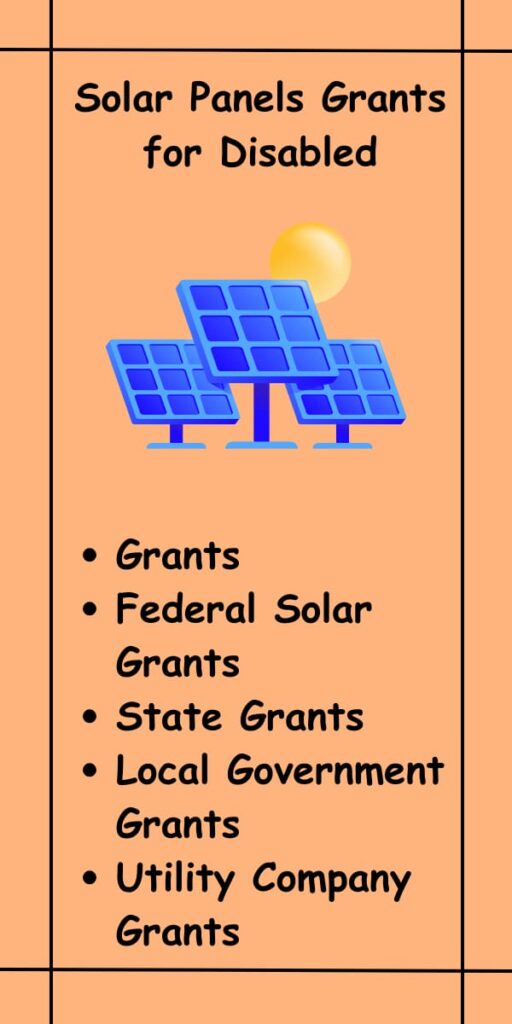
Solar panels convert the sun’s energy into electricity, a process known as photovoltaics.
Solar panels can be mounted on the canopy of a home or in another area with unstopped access to the sun and can give some or all of a home’s electricity.
Impaired stagers, including those looking for solar panels grants 2025 or solar panel grants for disabled veterans, can apply to several entitlement programs that support solar power in domestic homes.
1. Grants
Governments and intimate groups have created various entitlement programs to encourage solar technologies.
Grants are gifts of moneybags that don’t have to be repaid. Utmost solar energy allotment programs are available only to institutions similar to seminaries or non-profit associations.
Still, impaired stagers can apply to some entitlement programs that give plutocrats directly to individualities for domestic solar power.
2. Federal Solar Grants
The federal government has one program that supplies grants for solar panels in homes for impaired stagers to apply, making it possible for disabled veterans to get free solar panels.
The High Energy Cost allotment Program, managed by the U.S. Department of Agriculture, offers grants in areas where energy costs are significantly more advanced than average. Homeowners, including impaired stagers, can admit grants that can be used for solar panels on domestic homes.
3. State Grants
Two countries have allotment programs that give financing for domestic solar power, with finances available to impaired stagers and other homeowners, including specific Connecticut solar incentives and CT solar incentives 2025.
Connection cut’s On-Point Renewable Distributed Generation Program grants for low-income domestic energy systems.
The Pennsylvania High-Performance Building Impulses Program offers grants of over to 10 percent of the cost of erecting a” green” home, including solar panels.
4. Local Government Grants
The Climate Smart Solar Grant Program in Boulder, Colorado, has energy grants for low-income casing that give up to 50 percent of the backing for solar panels, helping those who are wondering, ‘do I qualify for government assistance for solar panels?
As with other grants for domestic solar, impaired stagers are eligible to apply.
5. Utility Company Grants
Minnesota’s Xcel Energy Renewable Development Fund Grants program provides finances for various energy systems, including domestic solar panels, and there are also rebates for solar panels available.
North Western Energy in Montana provides energy grants to its clients for solar panels.
Solar Panels for a Home Government Grant
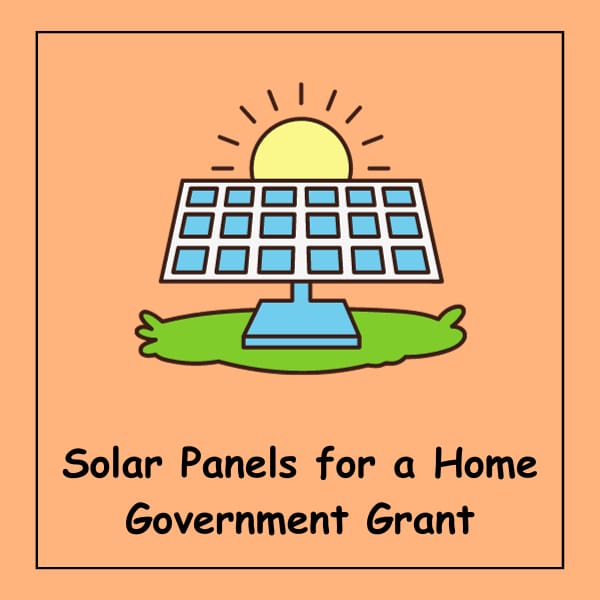
Homeowners who establish photovoltaic power systems receive considerable benefits such as lower electric bills, lower carbon impressions, and potentially increased home values, with some even qualifying for federal solar energy grants for homeowners.
But these advantages normally come with significant installation and maintenance costs, and the magnitude of the gains can run widely from one house to another.
The cost of solar panels is incredibly high, and utmost homeowners believe that it isn’t affordable for them.
This article will help homeowners make the economic calculations mandated to determine the viability of solar power in their homes, including understanding the cost of solar pool heater.
The homeowners who don’t go for renewable energy may apply for government grants for solar panels, free roof form, home form grants, and replacing windows.
Why are Solar Panels Important?
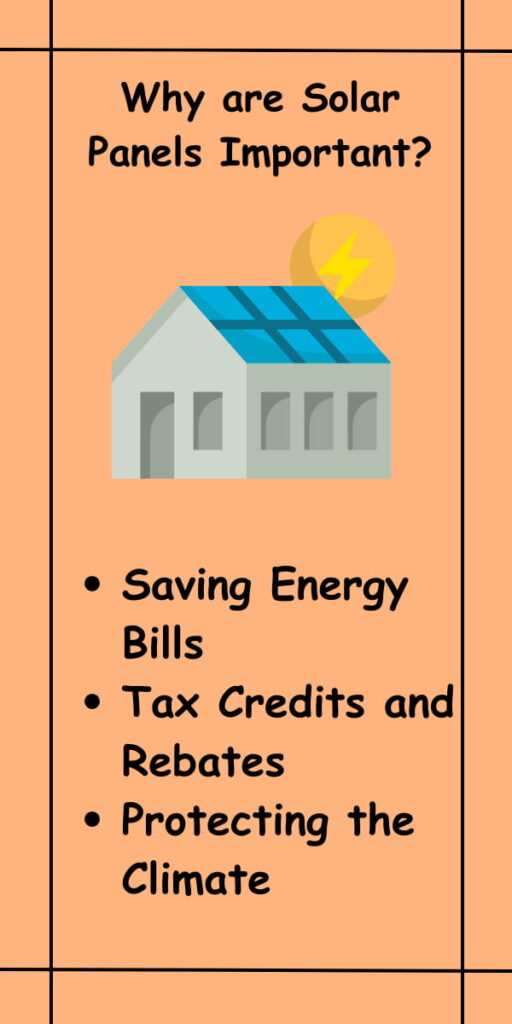
Solar panels are now the innovation and investment to ensure our coming generation will get a greener and better future.
This is crucial for those considering how much does solar pool heating cost and how much is a solar pool heater.
Solar panels are electricity generation outfits, and it’s a source of clean energy.
This energy source can make sure someone is personality-reliant and benefits reduce the cost of energy. Surely people are encouraged to use solar panels because it’s saving moneybags and the climate.
Also, the Government of the United States of America has always valued green and clean energy, and they have managed solar panel grants for homeowners in numerous programs to make the program work perfectly.
1. Saving Energy Bills
You can also reduce energy bills by installing solar panels by getting solar panel grants for homeowners.
Solar panels are now important for operating all electronics or appliances, such as refrigerators, air conditioners, and other appliances. But it is important to strike a balance with the use of natural energy and solar panels.
2. Tax Credits and Rebates
Energy is restricted, and everyone should save energy to better the world and the coming generation. Surely the energy source comes from coal, gas, oil painting, and other reactionary constituents.
These are restricted, and people should reduce their reliance on energy and retain to use honest and neat points. So the government of the United States of America encourages individuals to move for clean and renewable fuel.
This country is evolving technology on solar panels, roofing, energy-saving backing, and financing for inventions on how to use renewable energy largely rather than non-renewable energy.
Also, there are other tax credits and rebates programs from the civil government to have responsibility and keenness to use renewable energy.
3. Protecting the Climate
Nothing will live in case the carbon outflow has no control. Surely the world is suffering some uneven energy deduced from coal, gas, and oil painting that pushes air and water pollution.
Global climate adaptation has been one of the leading enterprises in all countries worldwide, and it’s just because of using fossil energies and changing climate patterns.
Surly use of energy deduced from clean and pure sources similar to the sun via the solar panel can make a distinction to cut reliance on energy deduced from reactionary energy. The solar panels automatically induce electricity as energy, and we can use them safely and cover the climate.
Types of Solar Panels and Their Cost
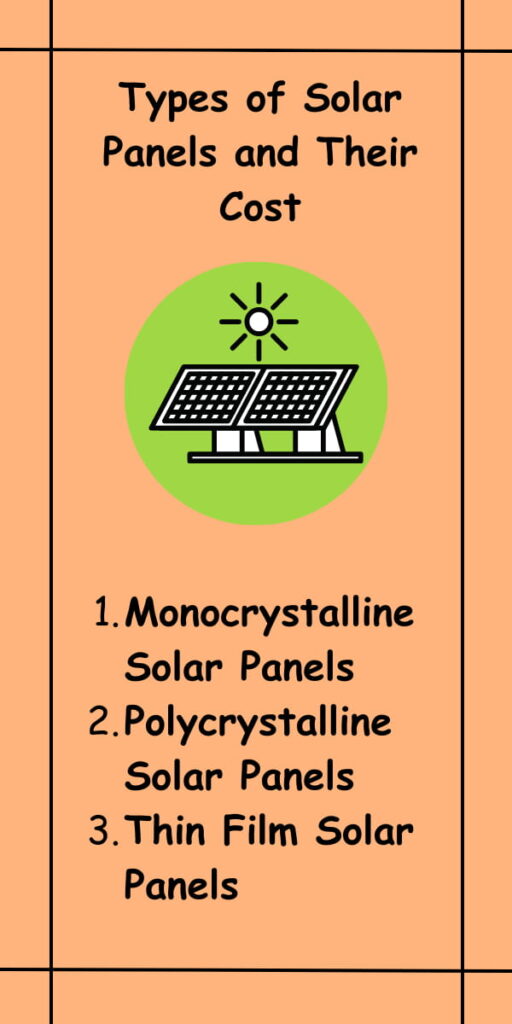
Solar Panels are a natural energy source of electricity, and people use this to induce electricity from the sun. The solar panels generally include solar cells made of silicon, boron, and phosphorus layers.
These factors have a different workshop to induce electricity, similar to the boron subcaste ensuring a positive charge; the phosphorus subcaste ensures a negative charge. A silicon wafer works as a semiconductor.
Now solar panels are getting important fashionability, and it’s seen everyplace as part of the electric force at home, business, and commercial structures.
Following are some types of solar panels as well as their cost.
1. Monocrystalline Solar Panels
Monocrystalline solar panels are considered highly effective and have top performance.
These solar panels are made of single glassware of silicon and electrons to make sure they can flow throughout the cell that adding effectiveness.
Pure silicon is one of the significant factors for solar panels, and its use makes sure monocrystalline solar panels are the most space-effective and long-lasting solar panels types.
These solar panels can be fluently linked by their common color, similar to black.
Cost of Monocrystalline Solar Panels.
The cost of solar panels turns on the number of panels. Utmost of solar panels come according watt by watt. So when you’re going to choose monocrystalline solar panels, you may spend $ 1 to $1.5 per watt.
Also, the quantity may be advanced according to watt use, and the average cost from buying an entire monocrystalline system to provisioning ranges from $ 6000 to$ 9000.
2. Polycrystalline Solar Panels
Polycrystalline solar panels are less effective than monocrystalline solar panels. It’s called multi-crystalline or numerous clear solar panels.
These are also constructed of silicon and multi-silicon fractions. The silicon is melted fluently and cool the fractions. Also, this silicon is moldered before reaching missed for the panel.
It causes electricity the same as monocrystalline solar panels.
Cost of Polycrystalline Solar Panels
The cost of solar panels counts on the number of panels and what you need for your purpose. Utmost solar panels come according to watt by watt.
So when going to choose polycrystalline solar panels, they may need to count from $0.90 to $1.0 per watt.
Also, the quantity may be advanced according to the use of watts, and the average cost of buying an entire polycrystalline system to provisioning ranges from $ 5400 to $ 6000.
3. Thin Film Solar Panels
Thin-film panels are made with actually fine layers, and these layers are thin, but these are flexible. Thin-film solar panels are formed by depositing a thin subcaste of photovoltaic substance onto a solid face like glass.
Different substances are similar to Unformed silicon, copper indium gallium selenide, and cadmium telluride that assemble solar panels according to a different types.
Thin-film solar panels come in diverse forms and sizes to create sure people can rig according to their requirements. Utmost of the large-scale service companies and assiduity use thin-film solar panels.
Cost of Thin Film Solar Panels
The cost of solar panels leans on the number of panels and watts you need for your purpose. Utmost solar panels come according watt by watt. So when you’re going to choose thin-film solar panels, you may need to count from $1.00 to $1.50 per watt.
Also, the quantity may be advanced according to the use of watts, and the average cost from buying entire thin-film solar panels to provisioning ranges from $ 6000 to $ 9000.
A large quantity of space may be needed for artificial purposes, and the expense may range up.
Conclusion
Solar energy is a neat, pollution-free, and renewable source of energy. This energy source demands developing an accurate, detailed long-term knowledge of the potential, taking into account seasonal variations. Solar Panels are a real source of energy as electricity.
Most Searching Post:
- Churches That Help with Homeless – Complete Guide
- Free Bus Tickets for the Homeless 2025
- Free Window Replacement Program 2025
- How to Get a Tummy Tuck for Free?- Best Way 2025
- Free Gas Cards for the Unemployed 2025
Frequently Asked Questions (FAQ):
How to Get Free Solar Panels from the Government 2025?
There are Different Solar Panel Grants for Homeowners. So low-income people can easily buy solar panels.
- Green Retrofit Solar Panel Grants
- High Energy Cost Grants for Solar panels
- REAP Solar Panel Grants (Rural Energy For America Program)
- Renewable Energy Solar Panel Grants
- Tribal Energy Program
- Department of Energy Solar Grants
- Federal solar grants
- Federal solar tax credit
- Solar power grants for farms
Solar Panel Grants for Homeowners
- Green Retrofit Solar Panel Grants
- High Energy Cost Grants for Solar panels
- REAP Solar Panel Grants (Rural Energy For America Program)
- Renewable Energy Solar Panel Grants
- Tribal Energy Program
- Department of Energy Solar Grants
- Federal solar grants
- Federal solar tax credit
Are There Any Government Grants for Buying Solar Panels?
There is no government grant for the purchase of solar panels. However, by installing solar panels with a smart export guarantee, homeowners pay for their electricity. So a homeowner can save up to $330 per year.
Solar Grants for Homeowners
It’s important to research and inquire about grants that are applicable to your area. Here are a few examples of solar grant programs:
- Federal Programs: In the United States, the federal government offers tax credits, such as the Solar Investment Tax Credit (ITC), which provides a percentage-based credit on the cost of installing a solar energy system. However, it’s worth noting that tax credits are not the same as grants since they reduce your tax liability rather than providing direct financial assistance.
- State and Local Programs: Many states and local governments provide grants or incentives to homeowners who install solar panels. These programs may include cash incentives, rebates, or low-interest loans. Examples include the California Solar Initiative, New York State Energy Research and Development Authority (NYSERDA) programs, and Massachusetts Clean Energy Center (MassCEC) grants.
- Utility Company Programs: Some utility companies offer grants or incentives to encourage homeowners to adopt solar energy. These programs may vary depending on the utility company and can include cash rebates, feed-in tariffs, or net metering arrangements.
- Non-profit Organizations: There are non-profit organizations that provide grants or other financial assistance for solar energy projects. For example, the U.S. Department of Agriculture’s Rural Energy for America Program (REAP) provides grants and loans for renewable energy projects in rural areas.
Solar Power Grants for Homeowners
These grants are typically offered by government agencies, non-profit organizations, and utilities to promote renewable energy adoption and reduce reliance on fossil fuels. Here are some common types of solar power grants for homeowners:
- Government Grants.
- Non-profit Grants.
- Utility Company Grants.
- Community and Cooperative Programs.
Grants for Solar Panels for Homes
While grants specifically designated for solar panels may be less common than other incentives like tax credits or rebates, there are still some programs available. Here are a few options to consider:
- State and Local Programs.
- Non-profit Organizations.
- Utility Company Programs.
- Federal Programs.
Government Grants for Solar Panels for Homeowners
Government grants for solar panels for homeowners are financial assistance programs provided by government agencies to support the installation of solar energy systems in residential properties. These grants are aimed at promoting renewable energy adoption, reducing greenhouse gas emissions, and increasing energy efficiency. While grants specifically designated for solar panels may be less common than other incentives like tax credits or rebates, there are some programs available. Here are a few examples:
- State and Local Grants.
- Energy Efficiency Programs.
- Renewable Energy Grants.
- Community Programs.
Homeowner Grants for Solar Panel Installation
Homeowner grants for solar panel installation are financial assistance programs provided to homeowners to support the adoption of solar energy systems in their properties. These grants aim to offset the upfront costs associated with installing solar panels and encourage the transition to renewable energy. While grants specifically dedicated to solar panel installation may be less common than other incentives like tax credits or rebates, there are some options available. Here are a few examples:
- State and Local Programs.
- Non-profit Organizations.
- Utility Company Programs.
- Federal Programs.
Free Solar Panel Grants for Residential Properties
As of my knowledge cutoff in September 2021, there are no specific grant programs that provide free solar panels for residential properties. While there are various financial incentives and programs available to help homeowners offset the costs of installing solar panels, they typically require some level of investment from the homeowner.
The most common financial incentive for homeowners is the Solar Investment Tax Credit (ITC) in the United States, which provides a tax credit based on a percentage of the eligible costs of installing a solar energy system. However, the ITC reduces the overall cost of the system rather than providing free solar panels.
It’s worth noting that some community-based programs or non-profit organizations may offer assistance to low-income households or specific communities to help them access solar energy. These programs may provide grants, subsidies, or financing options to make solar panels more affordable. However, availability and eligibility criteria for such programs can vary significantly depending on the location.
To explore potential financial assistance programs, grants, or incentives for solar panel installation in your area, it’s recommended to research state and local government websites, energy departments, non-profit organizations focused on renewable energy, and utility company programs. Additionally, resources like the Database of State Incentives for Renewables & Efficiency (DSIRE) can provide comprehensive information on incentives specific to your state.
It’s essential to stay updated on the latest information and program changes, as incentives and grants can evolve over time. Consulting with local solar installers or reaching out to energy experts in your area can also provide valuable insights into potential funding opportunities for residential solar panel installations.
Applying for Solar Panel Grants as a Homeowner
Applying for solar panel grants as a homeowner typically involves several steps. While the specific process may vary depending on the grant program and your location, here is a general outline of how to apply for solar panel grants:
- Research Available Grant Programs: Start by researching available grant programs for solar panel installations in your area. Explore government websites, energy departments, non-profit organizations, and utility company programs to identify potential grants that you may be eligible for. Resources like the Database of State Incentives for Renewables & Efficiency (DSIRE) can help you find relevant programs specific to your state.
- Determine Eligibility: Review the eligibility criteria for each grant program to determine if you meet the requirements. Common eligibility factors include residency, property ownership, income limits (if applicable), and specific project criteria related to solar panel installations. Pay attention to any restrictions or preferences, such as grants targeting low-income households or specific communities.
- Gather Documentation: Prepare the necessary documentation to support your grant application. This may include proof of property ownership, identification documents, income verification (if required), and any other documentation specified by the grant program. Make sure to gather all the necessary paperwork in advance to streamline the application process.
- Complete the Application: Fill out the grant application form carefully, providing accurate and detailed information. Some grant programs may require you to submit additional materials, such as project proposals, contractor bids, or project plans. Follow the instructions provided by the grant program and submit all required documents within the specified deadline.
- Review and Approval Process: After submitting your application, it will typically go through a review and evaluation process. The grant program administrators will assess your application based on the eligibility criteria and the program’s priorities. This process may take some time, and you may be contacted for additional information or clarification if needed.
- Grant Award and Project Implementation: If your application is approved, you will be notified of the grant award and any conditions or requirements associated with it. Follow the instructions provided by the grant program to proceed with the solar panel installation project. This may include working with approved contractors or meeting specific project guidelines.
- Compliance and Reporting: After completing the solar panel installation, you may be required to provide documentation, such as project completion reports, proof of expenses, or post-installation inspections. Some grant programs may have reporting requirements to track the impact and effectiveness of the funded projects.
Financial Assistance for Homeowners Installing Solar Panels
Homeowners installing solar panels can explore various financial assistance options to help offset the costs of installation. Here are some common forms of financial assistance available:
- Solar Investment Tax Credit (ITC).
- State and Local Incentive Programs.
- Property Assessed Clean Energy (PACE) Financing.
- Energy-Efficient Mortgages (EEMs).
- Home Equity Loans or Lines of Credit.
- Solar Leasing or Power Purchase Agreements (PPAs).
- Non-profit and Community Programs.
